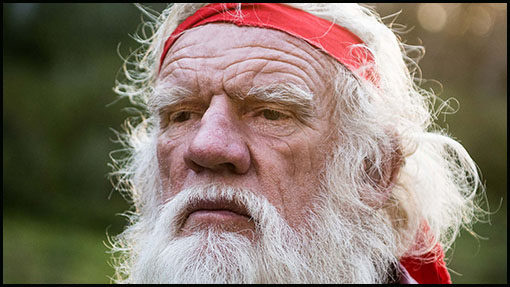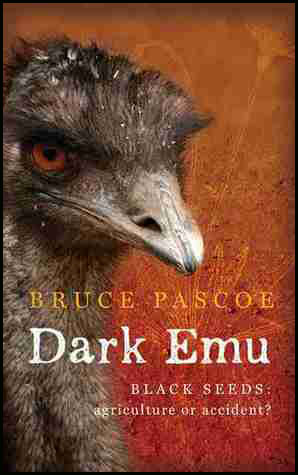Dark Emu
_____________________________
"Dark Emu injects a profound authenticity into the conversation about how we Australians understand our continent ... it is essential reading for anyone who wants to understand what Australia once was, or what it might yet be if we heed the lessons of long and sophisticated human occupation." Judges for 2016 NSW Premier’s Literary Awards.
Dark Emu puts forward an argument for a reconsideration of the hunter-gatherer tag for precolonial Aboriginal Australians. The evidence insists that Aboriginal people right across the continent were using domesticated plants, sowing, harvesting, irrigating and storing – behaviours inconsistent with the hunter-gatherer tag. Gerritsen and Gammage in their latest books support this premise but Pascoe takes this further and challenges the hunter-gatherer tag as a convenient lie. Almost all the evidence comes from the records and diaries of the Australian explorers, impeccable sources. (Good Reads)
_____________________________
_____________________________
Dark Emu's infinite potential:
'Our kids have grown up in a fog about the history of the land'
(Bruce Pascoe)
The Guardian

by Lorena Allam
Lorena Allam is descended from the
Gamilaraay and Yawalaraay nations
of north west NSW and is the
Guardian's Indigenous affairs editor
In the night sky, you can see Dhinawan the emu in the glittering sprawl of the Milky Way. But clever, industrious Dhinawan isn’t made of stars; he’s subtle and elusive. Dhinawan is found in the dark space between the lights. Dhinawan embodies the quiet ingenuity of Indigenous knowledge systems: there, right before your eyes, yet requiring a different way of seeing.
Bruce Pascoe’s groundbreaking Dark Emu was first published in 2014, and has been showing us different ways of seeing the country and its “truer history”, as Pascoe puts it, ever since.

Bruce Pascoe
Dark Emu has won a slew of awards and inspired many projects, from poetry to permaculture, from the arts to agriculture, and was adapted into a dance performance by Bangarra in 2016.
Writing it, Pascoe says, required a big shift in his own thinking. While researching another book, Convincing Ground, about the 1834 massacre of between 60 and 200 Gundidj Mara people in Victoria, he kept reading colonial accounts of Aboriginal people farming: irrigating, harvesting, living and prospering in large villages.

“I had disbelief. I’d read the record and kept thinking to myself, ‘surely that can’t be right’,” Pascoe says. “An observation of that importance couldn’t have gone straight through to the keeper without anyone in education or politics or history remarking on it, but that’s what happened.
“My publisher knocked it back very promptly. It didn’t ring a bell with them but then, their major editors were all English, so I wasn’t surprised.
“Then the Aboriginal studies press had it and similarly they couldn’t believe the information. And then I realised, when I had that trouble, that the sources I would have to use exclusively would be unimpeachable European sources.”
Pascoe immersed himself in those records – such as the diaries of explorers, which were surprisingly full of information about the way Aboriginal people managed their lands.
“You have to read them in the original form, without the editing, because in some of them there was a severe edit before they became public documents, and often the only stuff missing was the observations about Aboriginal use of land,” Pascoe says.
It was a challenge to all the things he’d been taught as a schoolboy. “It was a shock because I’d grown up with the concept of the Australian bush the way it was in the 50s and 60s. I was of a generation who were taught to laugh at the colonial painters because they’d got it wrong. They were trying to paint England, with the beautiful green understorey, open plains with oases of taller trees among parkland. They were accused of trying to paint England, and they were in fact painting what they saw.”
In Dark Emu, Pascoe quotes the explorer Charles Sturt, who – weak with hunger and thirst in the desert of central Australia in the mid 1840s – climbed a sandy ridge and looked beyond, astonished to find a happy, thriving village of a “most animated description”:
"So far from exhibiting any unkind feeling, they treated us with genuine hospitality, and we might certainly have commanded whatever they had. Several of them brought us large troughs of water, and when we had taken a little, held them up for our horses to drink … they likewise offered us some roasted ducks, and some cake."
Compared with those times, Pascoe saw in the historical record a measure of how degraded the land has become – but also, how it can be restored.
“It’s hard to overstate the damage that’s been done to the land, when you read about particular districts and how the grass was higher than the horse’s saddle,” he says. “Now when you go there, it’s red dust, blowing away, and you know that some terrible crime has been committed against the land.
“The Earth wants to repair itself, that’s the thing; we see it all the time. The farm I’m working on, I got rid of the cattle and within a season the grass was knee-high again. And areas that had been cut, that should never have been cleared at all, where they were showing their bones through the soil, they’ve come good again.”
Pascoe has been growing kangaroo grass and using traditional burning practices to help it take hold and prosper. Native grasses have deep root systems, which help guard against erosion.
Pannicum is the native grass that Aboriginal people ground into flour for the “cake” that saved Charles Sturt.
Since publishing Dark Emu, Pascoe and others have been working on reviving that knowledge.
“Younger people are very keen. Permaculturists, soil scientists, they’re all really keen to get involved,” Pascoe says.
“We’re doing research at the University of Melbourne on nutritional values of some of these plants. We’re looking at threshing techniques. We’re looking at harvesting machinery. All of these things are starting to happen.
“And farmers, traditional farmers, they’re some of the most enthusiastic because they know they’re going broke. They know their economy is stuffed and they’re looking at other ways of growing stuff in Australia.
He adds drily: “Lightbulbs take a long time to glow.”
Compare this with the anguish our ancestors must have felt watching their cultivated lands destroyed so rapidly – within a decade of colonial settlement, in some places.
“Devastating,” Pascoe says. “There were reports of whole dams being drunk dry by mobs of cattle. It must have been shattering. And to see those same mobs of cattle destroy a field of murnong [yam] or grassland that had been cultivated for thousands of years must have been shattering.
“I think that’s still the trauma that’s reverberating around the country at the moment.
“The country is sick. It’s in pain. It’s thirsty.”
Dark Emu was named book of the year and won the Indigenous writers’ prize in the 2016 New South Wales premier’s literary awards. In March last year, Pascoe received the Australia Council award for lifetime achievement in literature.
Next month, Magabala Books will release Young Dark Emu, a version for younger readers – an audience Pascoe is delighted to be able to reach.
“It will give them a chance to learn what really happened in their country, and also make them proud of such an incredible history,” he says.
“Our kids have grown up, for 200 years, in a fog about the history of the land.”
Clearing the fog is a long process.
“I think the country’s ready for it. I think one of the reasons Dark Emu has had that sort of impact is because Australians are much more ready now to look at these things.
“My generation is in total denial. Even good friends of mine still struggle to get their heads around what the country was really like, so I think to give our kids this education is really important for the psychology of the country.
“The people who know the history of their country are going to make vastly different decisions.
“And I say to them: approach it with joy. Here’s an opportunity to learn the real history and learn your country, learn what makes your country tick.”